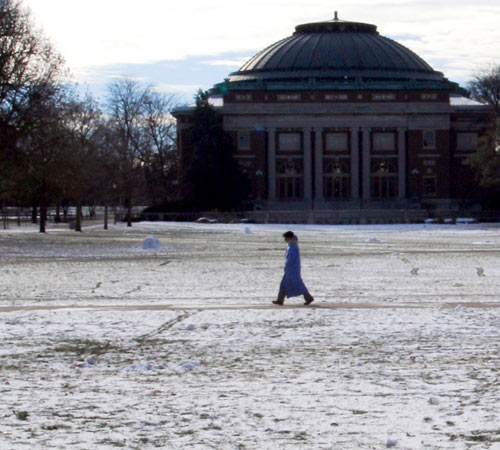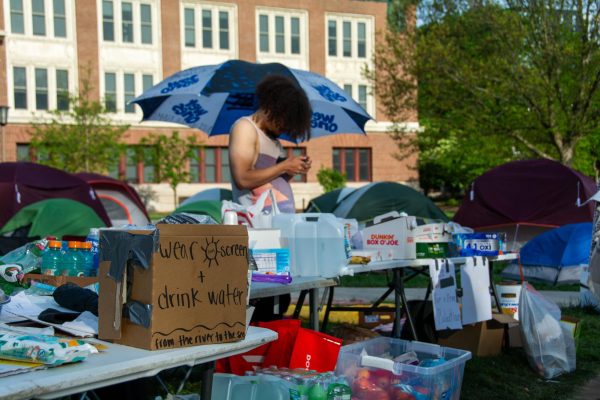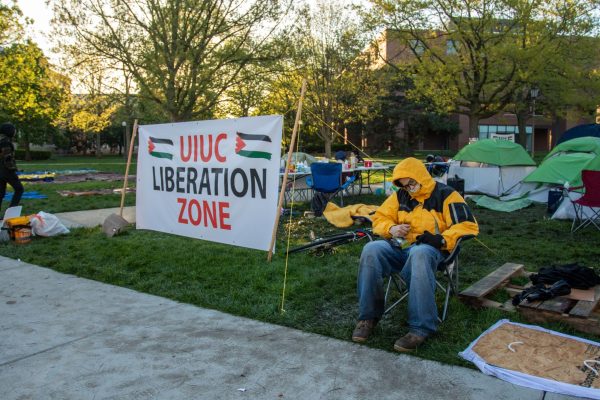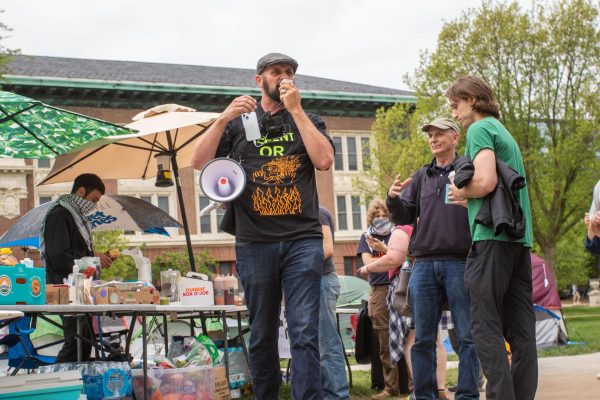Campus prepares to slow down

Erica Magda
December 12, 2008
By the end of next week, an unnatural silence will fall on the Quad. The bustling center of campus will be vacant, and students and instructors will be scarce.
On Green Street local establishments are quiet, and the waits for restaurants are short, if not nonexistent.
“Greet Street is dead,” said Melissa Gonzalez, general manager of Mia Za’s Cafe. “Usually you see 500 people in like 10 seconds, and over break you see like one person.”
Mia Za’s will continue to operate over the break, but might close an hour early some nights. The restaurant will also be short on staff because most of the workers are students, Gonzalez said.
She said the restaurant is not worried about the slow business, even in light of the economy.
Get The Daily Illini in your inbox!
The nightlife on campus will also fall quiet. Eric Meyer, the owner of Kam’s, said business usually falls by about 15 to 20 percent from what it is when classes are in session.
He also said recently his business was beginning to see some effects of the economy.
“The student population is a little bit insulated,” Meyer said. “In the last four weeks we’ve begun to see the effects (of the economy) more than during the fall.”
Because of the poor economy he said it will be interesting to see how business fares during the break.
“We don’t have a bowl game this year, but the cost of New Year’s in Chicago area is pretty high,” Meyer said.
Kam’s will be hosting its annual New Year’s Eve party that includes catered food, coat check, decorations and champagne at midnight, he said.
“Staffing is always a difficult thing,” Meyer said. “We basically double their wage (for New Year’s Eve). We rely on some of our University students and we usually hire a few students who are home from their breaks.”
But the quiet campus will not be completely deserted as many faculty, graduate students and international students will remain on campus during winter break.
University Housing asks students to take care of housekeeping matters, such as taking out the trash, shutting their windows and taking home pet fish, before they leave, so that the staff department doesn’t have to figure out how to humanely euthanize your fish, said Kirsten Ruby, assistant director for housing and marketing.
Once the students have left, cleaning services enter each room to make sure the windows are shut and to make any minor repairs.
Some graduate students will stay on campus for the break, like Melanie Hogendorp, who will stay with her husband, Brian, also a graduate student.
“I own a house here and will be working on my dissertation,” Hogendorp said. “As a doctoral student, it’s important that the research doesn’t stop.”
She said the campus is very quiet over break and she uses the time to do work and research.
“I work with students on a daily basis and many do not stay on campus, so I can get my work done,” Hogendorp said.
With a smaller population on campus, certain facilities will operate at reduced hours or be closed.
The Undergraduate Library will be closed from Dec. 23 to Jan. 4, 2009, and will reopen the next day, but will operate at reduced hours from 8 a.m. to 5 p.m.
“The students (workers) want to leave when their finals are over,” said Lisa Hinchliffe, the head librarian for the library. “So we might be short-staffed for a bit.”
While students are gone, the IT department will shut off as much equipment in the library as possible in the interest of saving energy, Hinchliffe said.
“(The library) is nothing like during the semester, but there’s a steady stream of people,” Hinchliffe said. “There are graduate students doing research, and faculty and TAs who need to prepare for courses.”
The athletic facilities on campus also have reduced hours, and for the first two weeks of break only CRCE will be open, and the last two weeks of break only the ARC will be open, said Erik Riha, director for marketing for Campus Recreation.
He said faculty, staff and international students still use the facilities, but usually only a few hundred people come through the facilities daily as opposed to the 4,000 to 5,000 during the semester.
“It’s just something that happens every year,” Gonzalez said. “The students always go away and then they come back, and business is the same again.”






